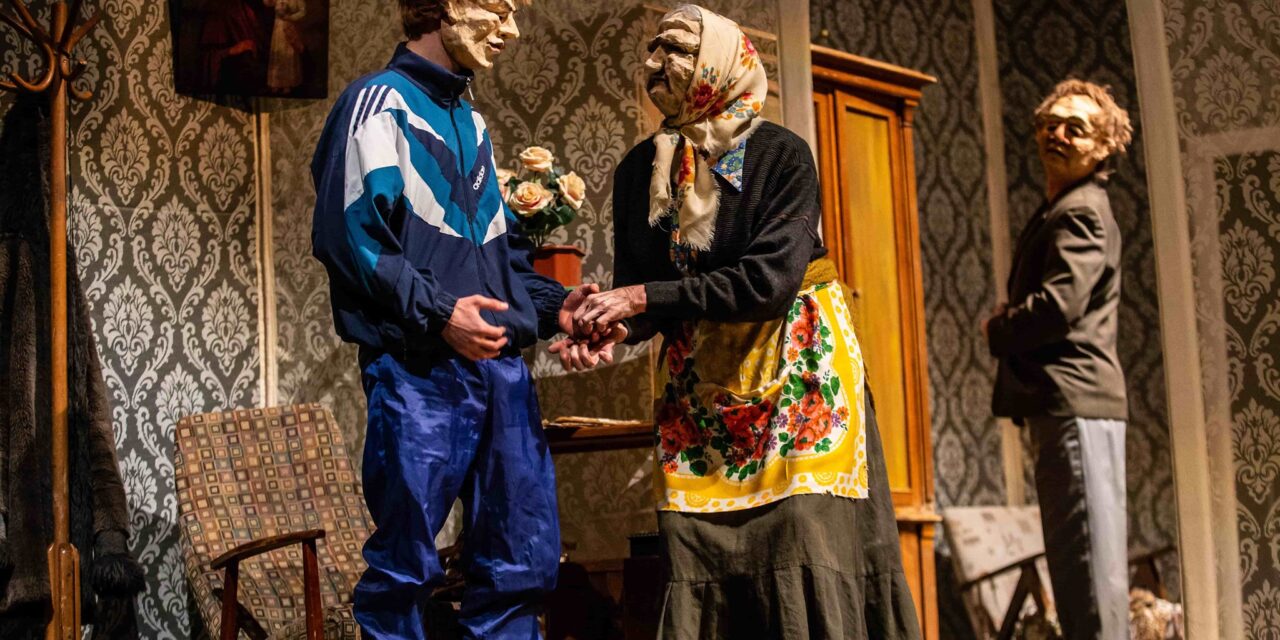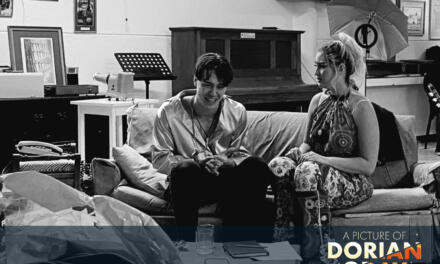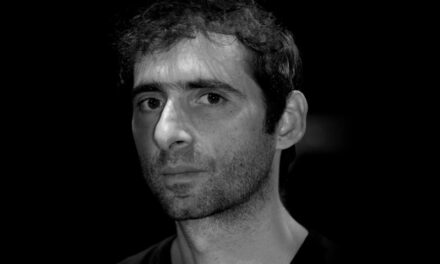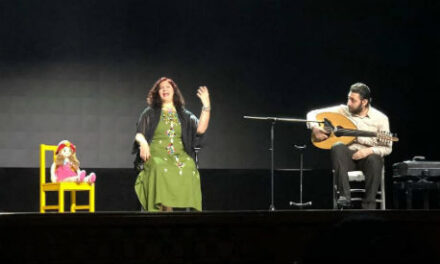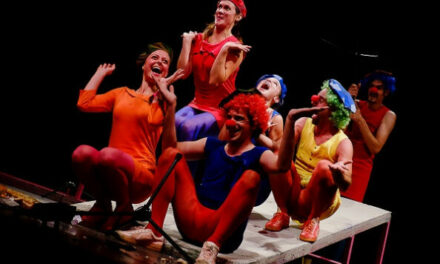Artistic and Financial Director, Stas Zhyrkov and Director, Matteo Spiazzi, give their take on their production of Family Album and its impact on our current climate of pandemic proportions. I first came to know Mr. Stas Zhyrkov and Mr. Matteo Spiazzi through the International Online Theatre Festival after viewing their production of Family Album online. The production, originally intended for in-person performance, was selected among several other shows for the IOTF at the Theatre Times for extended access and online viewing. This production gained its selection for its tragicomedy structure and topic of cultural and familial conflict within the three generations represented in the production of the show.
The play looks at three generations in the ’90s, during the transition into Ukraine’s independence from Russia in the small apartment and home of a grandmother and her family. During a time when staying at home is mandatory in 2020, it is incredibly relevant today. It is a show which expands all cultures and languages as a fully masked physical theatre experience engaging in no dialogue and extensive physical acting. Such a style of performance, therefore, engages all audiences who can relate to our own societal obstacles in unforeseen times such as those similar to the play. In my time with the festival and the production, I have found Zhyrkov and Spiazzi’s insight of not only their production but its impact on society incredibly important and relevant to our current times. It was for this reason, I asked to interview them both, which they kindly agreed. The interview was conducted online individually and combined for the article featured.
Q: Please indicate who you are, your position in the production of Family Album, and your background in the theatre.
Stas Zhyrkov: My name is Stas Zhyrkov and I am the artistic and financial director of the Left Bank Theatre in Kyiv, Ukraine. In my role, I am responsible for the production similar to a financial director, and as a lead artistic director of the Left Bank Theatre. In my position, it is my job to select the productions produced at the theatre, and it was my decision to take on Family Album into our season. Before the Left Bank Theatre, I was also an actor, director, and financial director for Independence Open Mind Theatre. After that, I worked at the Golden Gate Theatre for five years, and then I was selected for the Left Bank Theatre after a competitive selection process.
I was selected alongside my partner Tamara Trunova who became the main director of the Left Bank Theatre. In Family Album, the director, Matteo Spiazzi’s work on the ideas of the show, whereas I maintain my role helping to guide the production along as the artistic and financial director, helping to make the show work. In addition, I manage and assist with the budget and organize the production. At Left Bank Theatre, we as a team worked with Matteo Spiazzi as well as the Italian Institute in Kyiv, expanding relationships between communities. These connections helped tremendously for collaboration and financial assistance moving forward with the production.
Matteo Spiazzi: My name is Matteo Spiazzi and I am the playwright and director of Family Album. I was born December, 1st, 1987 in Verona, Italy, and graduated from the Accademia d’Arte Drammatica “Nico Pepe” (Udine, Italy 2010) I have worked as an actor, director, drama teacher, and event organizer in Italy and in many different countries such as Austria, Belarus, Czech Rep., Ecuador, Estonia, Slovenia, Poland, Ukraine, and Russia. I specialized in mask work and in particular in “Commedia dell’Arte” and have held workshops at the University of Verona, the Universidad Central de Quito in Ecuador, with the University of Tartu (Art department in Viljandi), the National Academy of Dramatic Art Belarus, the National Academy of Dramatic Art in Minsk (Belarus), Kyiv University of culture (Ukraine), and DAMU Academy (Czech Republic).
Some of my productions are still running at the Left Bank Theatre (Ukraine), the Theatre of Nations / New Space Moscow, the Gorkij National Academic Russian Theatre (Minsk, Belarus), the Maribor Lutkovno Gledališče Theatre (Maribor, Slovenia), the Teatr Tęcza (Słupsk, Poland), and the Kuressare Linnateater (Kuressare, Estonia). I have also worked with the Theatre Cwarta Scena/Teatr Slawsky (Katowice, Poland), and Dada Zirkus in Vienna (Austria). I have acted in several plays in Italy, both in classical and contemporary theatre in addition to my work as a playwright. I am also one of the founders of the THEAOMAI (Theatre, University, City) project with the University of Verona. In my time as a theatre artist, I have in addition, been selected several times to participate in workshops held by famous directors for the “Biennale Teatro” in Venice for which I was honored to participate.
Q: How did you end up working on the production of the Family Album? What was your specific role in the production process? What sparked the creation of this specific story?
Zhyrkov: My role, in this case, was not on the direct process of the show but instead to help run the show, and help produced the production for the final debut. As the financial director, as I mentioned, I helped make financial decisions for the show and create the shows overall atmosphere.
Spiazzi: The artistic director and I met during the Jula festival in Munich, and after seeing the show “Pension Belvedere” of the Minsk theater, he [Stas Zhyrkov] asked me to collaborate with a mask project for Left Bank Theatre. The dramaturgy of the show was born from rehearsals. In Italy, we call it “stage dramaturgy”. After the first technical work on the mask; we began to work through many improvisations on the development of the topic “a Ukrainian family during the 90’s” that later developed into the final production viewed today.
Q: Mr. Spiazzi and Mr. Zhyrkov, as Directors in your own right, how did your dynamic work in rehearsal, and what were your goals as co-collaborators for this production? What was it you were trying to convey most in this piece?
Zhyrkov: As I mentioned before I mainly assisted in the overall process, rather than the decisions in rehearsals. I helped with the operations and overall production process, while the director took over the artistic manifestation of the plot and characteristics of the show. I maintained finances, marketing, and the overall line up of shows at the Left Bank Theatre which selected Family Album as a part of their season.
Spiazzi: The family is a widely used dramaturgical topic. With this show, I wanted to explore all the unspoken dynamics. The family is that place where profound tragedies and great acts of love take place; poetry is often hidden in the rubble. For me as an artist, it is always very important and fascinating to work with other human universes. Dramaturgical work was born with the actors, with them we talk about life lived, we think about our humanity, we look for common points and cultural differences. Working abroad is always a fertile meeting for me. The Family Album show was only possible in Kyiv and only with these artists.
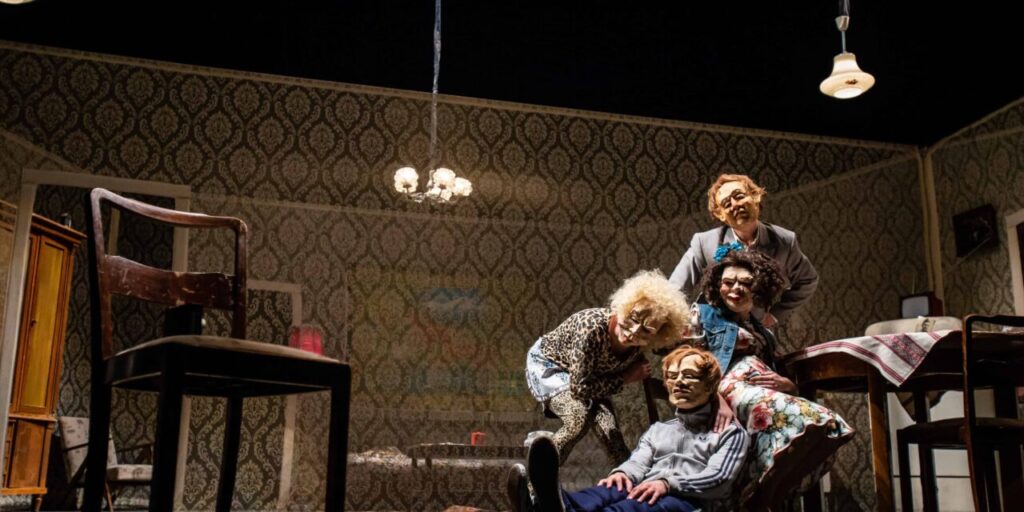
Family Album, Left Bank Theatre (Kyiv, Ukraine). Photo by: Anastasiia Mantach.
Q: I saw the Family Album production online, and I found myself feeling as though the piece had many parallels to our current global political climate, regarding the pandemic. Did either of you feel the same way I did, and if so, was this an intentional choice or just a result of good timing? With themes on the working class, finding home, family dynamics, and the conflict of government institutions, it appears there are clear parallels.
Zhyrkov: I am not sure the pandemic was meant to parallel the show. It doesn’t feel like Family Album was making a show in the moment knowing how it would impact the world in the future. But of course, it is an important moment, it is an important moment for us. We are living in a time when there are lots of questions. Including how we will make it in the future, and regarding our family. His [Spiazzi’s] work is good and takes a look at these moments which parallel our struggles today.
Spiazzi: When the show was created, nothing was known about the lockdown we are experiencing. We tried to create a show that worked on archetypes. Clearly the time we live in changes the viewer’s gaze (which is part of the performance for me) and allows you to create other related meanings. This is an excellent sign of the show’s vitality.
Q: I noticed as each character introduced themselves to the audience as each appeared periodically throughout the play, that a larger metaphor could be assessed from the family to the Soviet Union’s decline. Just like the history of the Soviet Union, each generation impacted the other in both positive and negative ways.
The eldest grandmother, when she passed, appeared to represent the end of the Soviet Union as much as it directly meant the grandmother had passed away, especially since this show is set in the 1990s. Was this intended, and how does the family impact the larger political themes in the telling of this story?
Zhyrkov: Yes, it is a good idea to understand the story in this way. The main idea of the show is to make a simple story, but in this moment, we find something new, interesting, humorous, and something that is also still sentimental. We thought a lot about the audience when Spiazzi made this performance. They took a simple story but a really good story to create a larger meaning. This is hard in the theatre to do. However, in this moment, it was one of the first productions of our season, and it sold out. It worked out.
Spiazzi: That’s exactly how it is. We wondered how we could talk about history by telling a small story. We worked trying to tell the changing macro world, in the microcosm of society which is the family. The character I love most is certainly the grandmother, who represents an ancient world that has vanished, much older than the Soviet Union. Grandmother represents the root of the family identity. The vareniky (traditional Ukrainian pasta), the icon in the corner of the room, and the album; are the symbols that the grandmother strongly defends. To represent the Soviet Union that is becoming something else, it is more likely the father in crisis, who without more work finds himself an alcoholic and without purpose. Eventually, he will decide to become something else. Unfortunately, the world of grandmother with her death will never return. The final photo, which will be added to the album is certainly a sign of positive hope, and an invitation not to forget who we were and where we are going.
Q: What obstacles did you face when you were starting out creating this show? This production, as you are well aware, is unique in its use of movement to evoke storytelling and the use of masks as modern Commedia dell’Arte. What sparked these choices?
Zhyrkov: During rehearsals, there were some problems. The main issue was that there was not a lot of time to prepare. Several days, he [Spiazzi] was out, and then the cast had one month to prepare. The actors had to learn something new because it was unique and new to them, so they had to adapt. It was interesting how the actors would work with the piece, especially the masks and movement. Spiazzi is really good and worked well with them. It is a really cool work as an artistic director to see the show transform into its final existence.
Spiazzi: For many years I have been trying to carry out experimentation with the language of masks. I began to specialize from the beginning of my career with the Commedia dell’Arte and trying to upgrade this language is a challenge that I still try to pursue. Pedagogy is the means I use to do this job. I have had many opportunities to develop special pedagogical techniques that would allow me to work with masks in an unconventional way. I do not consider myself a demiurge director, the heart of my theater is the actors, and therefore it is essential to put them in the condition to be able to work to the best of their potential.
The difficulty of working with full masks consists first of all in developing in the actors a profound awareness of the expressive potential of body language. These whole masks do not allow the use of the word, therefore the set of actions and the quality of the actions constitute the dramaturgy. The work is very minimal, we have tried to express complex situations and thoughts, only with the quality of movement, without making it a pantomime. In fact, pantomime is another thing, it compensates for the deficit of non-words with gestures that represent words. In this work we have tried instead to look for moments when the word is not necessary, the facts speak. For the actors, it was a difficult and huge job. Each replica the actors continue to explore new possibilities of the show.
Q: There are plenty of beautiful motifs in this play, such as the many physical photo props. Regarding the various photos and photo albums that were displayed around the apartment in the production, what was the reason for this imagery? How does it impact the show since dialogue, in this case, is obsolete?
As an audience member, I felt a stronger sense of community and generational tie to the characters and the culture established in the piece. Was this what you were aspiring towards?
Zhyrkov: Some of the signs in the show make us aware that we are the first generation without any information for the future. We have social media and videos, it is not the same, because we don’t have printed photos anymore. No one will know us the same way from our history. We want to share that we need to still document our histories aside from technology to keep our legacies. It can be erased in the future, nothing about us will remain. It could all be lost if we don’t document the way it was done in history.
Spiazzi: Photos, images, situations become symbolic, and clearly all objects and events are designed to mean more things. Dialogue is not superfluous, but often when we don’t speak, we show authenticity through our actions. The sense of human community is certainly transversal, for this reason, the show is intelligible to an audience with different cultural backgrounds. Often when I create a new performance I work on the spectacular process, even before the result that it will have on the public.
Q: The music I noticed was also just as important as the masks in telling the story, in addition to the dimmed lighting to create characters. How did you decide these types of choices when developing the characters with the actors since all the characters did not speak, and what was it you were trying to convey most to the audience by avoiding dialogue?
Zhyrkov: This is a really important moment. All the music was made before 1991 in the show. It is also only Ukrainian music. There is a lot of really sentimental music, and it feels so lovely and is done so on purpose so that the audience can think about the music. It is in another way to show the culture, the culture that the Soviet Union said we didn’t have. It is a moment to say that sometimes we made something good and that we do have a culture of our own. It is a way to fight for independence. It is a good moment that it is beautiful, and it is also for the fight for Ukrainian people for their independence.
Spiazzi: Music is a fundamental element. I spend a lot of time choosing the right music. Obviously, it was interesting for me to do research on Ukrainian music from the 60s and 80s. I myself played games with the actors and then I sang a Ukrainian song at the premiere party. Music often represents an emotional atmosphere. Music is clearly used as a narrative line that intertwining with the narrative lines of the characters creates syntonizers or contrasts. We used the pre-existing dialogues (tv/radio) as a game. We integrated them into the fabric of the scene. Where it was possible to interact with a foreign element such as TV, we found ideas and connections in the creation of the scene, but much more as a fun game. The lyrics of the songs instead often open metaphorical and poetic spaces to the scene that happens at that moment.
Q: As an audience member who does not speak the native language in the production, I am curious about the radio and T.V. commentary that was in the background when the music was not playing in the production. (I am only bilingual, so I had to watch the actors to learn what was happening in these moments). Luckily, I was able to interpret the meaning thanks to the actors. About thirty minutes into the production is when we first hear the dialogue from these devices, both the T.V. and Radio. Is this to establish the setting and political atmosphere? Why else was this dialogue incorporated when it is so clear dialogue was intentionally left out otherwise?
Zhyrkov: The moment about t.v it is a part of a t.v show and is a very cool moment. Everyone knows the shows referenced. The ’90s had a lot of Mexican and Brazilian shows in their television. People were often not in the city or in the street, but instead, were watching t.v and they were talking about shows they love. Everyone recognized the commentary, it is familiar and connects the community together in their reminisce.
Spiazzi: We used the pre-existing dialogues (tv/radio) as a game. We integrated them into the fabric of the scene. Where it was possible to interact with a foreign element such as TV, we found ideas and connections in the creation of the scene, but much more as a fun game. The lyrics of the songs instead often open metaphorical and poetic spaces to the scene that happens at that moment.
Q: I noticed this play is set in the 1990s, at the verge of the Soviet Union’s decline, but also during a time of great historic change. As a theatre artist, I have observed that often-times, the most popular theatre is theatre that mimics a nostalgic time, in order to escape our current historical existence.
Do you agree with this thought process? Is there a nostalgic component to your choice to set this show in the ’90s despite the sadness that this show evokes and to what extent was this show escapism from our current reality and how much of it is reflecting upon the current status of our history?
Zhyrkov: Nostalgia is one of the tasks with this performance. The independence in 1991, was important. However, in the ’90s there was not a lot of culture yet, so there was Soviet Union culture. A lot of Ukrainian culture was still in Russian. That is why the show was so important because there is a mixture of culture and the show intended to also highlight the Ukrainian culture that was often lost because of Russia. To see the separation of the two. To recognize the difference.
Spiazzi: Often talking about the time we live with a show set in the time we live in is extremely difficult, as there is not enough distance to analyze and use the symbols of that period/time. Once passed, or once events are in a precise past, they immediately become full of meaning. It was not a nostalgic feeling that pushed me to work on the 90s. I think it is extremely difficult to work on the present by telling the present. The past, now fixed and no longer mobile, allows us to analyze events and understand their symbols. The 90s were a period of great changes, radical social transformations. I think that even today we live in this time of profound change. Talking about that period was also a way for me and the actors to think about those historical moments in which changing the world, we risk losing or forgetting a past, or rather the memory of a past, which is fundamental for us to have an awareness in building our future. That’s why we need a family album!
Q: Family Album is a tragicomedy. Theatre artists like to argue that comedy can sometimes be the most truthful genre. Combined with tragedy, to balance out the comedic components, a piece can have exceptionally thought-provoking results for its audiences. Why did you choose to work in the genre of the tragicomedy and how do you think it helped to share the story of family to the audience?
Zhyrkov: Tragicomedy is the best genre for this time. Because our life is a tragicomedy. We wake up and we don’t want to deal with life but then we find the good moments in the darkness. It is for this time and for people. It is like this in family life, it fits life. It is a good moment to see this in the Family Album.
Spiazzi: The bitter taste that is created by remaining in the balance between comedy and tragedy has always interested me a lot. The ability to represent a wide range of emotions on stage gives me the impression of being able to create a complex artistic product that does not want to be a true representation of life, but as in poetry, a condensed metaphor of meanings
Q: How do you think viewing your show away from the Left Bank Theatre and instead producing it online has impacted its interpretation?
Zhyrkov: It has been cool to see the show go online. However, online theatre is not the same. We are not masters of this process, but we try to be modern and European and open to change. It is an honor. To be a Ukrainian theatre in such a good company in such a big festival, and it is great that we are a part of this company and given a chance to represent ourselves and be seen and recognized by others. So of course, we try to be seen and share our work with the world and it is a good moment to try to do this.
Spiazzi: Unfortunately, the online theater is extremely limiting. it is an excellent tool to learn about shows that otherwise could hardly be seen by such a large audience, but I deeply believe that theater is the art of meeting and seeing the show live is perhaps the only way to fully enjoy it. having said that I am extremely happy and grateful that the show has been selected, that it has had this visibility! I very much hope that it will be seen live by many people.
Q: Can you tell us more about your upcoming project(s) that you are excited to share? How are you handling our current pandemic crisis regarding your work and what are your aspirations for the near future? What is your hope for theatre moving forward?
Zhyrkov: For our next project, we will make a play, of a famous writer from Europe and Germany. It is about war with Ukraine and Russia. It is a really good play and story. It is really cool. And I hope we can play it in September at the theatre. We have already started rehearsals.
Spiazzi: I worked a lot online holding workshops and working on the ideation of new projects. I hope in August to be able to resume the rehearsal of a circus-theater show that I am setting up in Austria, and I have already received an invitation for new production in Kiev at the Left-bank theater. I am very happy to be able to carry on my research, which includes both pedagogy and experimentation on stage. My dream is to be able to make international productions involving actors from different nationalities! Since the show I create does not include the use of the word on stage, working with actors from different countries would be possible, and in my opinion, it would be a human and artistic experience full of creative ideas.
Thank you for your time and your participation in the International Online Theatre Festival.
This post was written by the author in their personal capacity.The opinions expressed in this article are the author’s own and do not reflect the view of The Theatre Times, their staff or collaborators.
This post was written by Melissa Denzer.
The views expressed here belong to the author and do not necessarily reflect our views and opinions.

